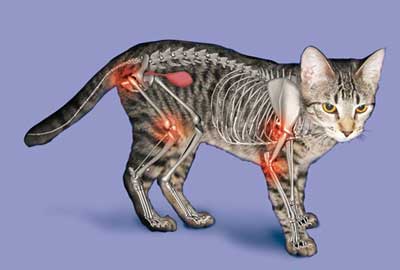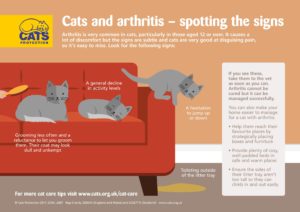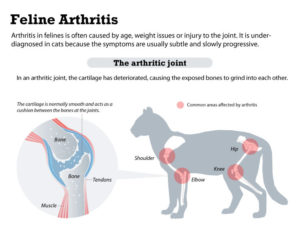Arthritis in Cats

All too common in cats, arthritis (also called degenerative joint disease or osteoarthritis) is a chronic, painful and progressive condition that involves their joints, particularly as they age.
Normally, the cartilage that lines and cushions a cat’s joints enables the bones to slide past each other smoothly and easily. But when a cat has arthritis, those smooth surfaces are worn down, making the bones grind against each other like sandpaper, leading to swelling, inflammation and pain.
The most visible symptoms of cats with arthritis include: limping, stiffness in their legs particularly after resting or sleeping, irritability, less time spent grooming, hesitance or reluctance to jump up or down, difficulty using their litter box, difficulty going up and down stairs, a reduced level of activity, reduced height when jumping, and hiding or sleeping more than usual.
Some of the most common factors that increase a cat’s risk of arthritis are: wear and tear (her joints may weaken as she ages); abnormalities (abnormal hip development can affect the cartilage around her joints): injury (a joint fracture or joint injury may cause arthritis) and genetics (some breeds, especially Maine Coons, Persians, Scottish Folds and Siamese have an increased risk of arthritis due to the abnormal development of their cartilage or hips).
While there’s no cure for arthritis, you, as a conscientious cat owner, can take steps to keep your precious pet as comfortable as paws-ible. If she’s suddenly slowing down or showing signs of pain whenever she moves, bring her to your vet right away.
Your vet will review her medical history and perform a thorough physical examination, looking for: visible joint deformity, obvious joint pain, decreased range of motion, grating (a scraping sound) when she moves her joints, fluid in the joints and unstable joints. To confirm a suspected diagnosis of arthritis, your vet will then x-ray your cat, focusing on the insides of her body in general and on her bones in particular.
If your kitty does indeed have arthritis, the following are the various treatment options available:
Non-steroidal anti-inflammatory drugs (NSAIDs). Your vet will determine the duration and type of treatment your cat receives.
Pain management medication. When NSAIDs aren’t appropriate or sufficient enough, your vet may add painkilling drugs to to the treatment plan.
Disease-modifying osteoarthritis drugs (DMOADs). One of the DMOADs commonly used is an injectable medication containing the active ingredient polysulfated glycosaminoglycan or PSGAG (Adequan® and Cartrophen®).
Acupuncture. An old healing practice in Chinese medicine, specially designed needles are placed at specific points in your cat’s body to help relieve her pain.
Cold laser therapy or photobiomodulation (PBMT). Non-invasive and shown to ease pain and decrease inflammation, this treatment involves your vet or vet tech moving a small device that emits therapeutic light waves across your cat’s body on top of her fur.
At home, it’s essential that you create a comfortable environment for your arthritic kitty by:
Giving her a soft, warm bed that’s easy for her to get into and out of.
Purchasing a litter box with one low side for easier access.

Providing her with a ramp up to her favorite place to rest and relax – whether it’s a window seat, the couch or your bed.
Keeping everything she needs and uses — her bed, litter box, food and water bowls — on one floor if you live in a house with several floors.
Using soft brushes when you groom her.
Ensuring she maintains a healthy weight in order to put less stress on her joints.
And remember: since cats are famous for hiding their pain, pay close attention to the subtle signs that something’s amiss. The sooner arthritis is caught and treated, the better.


